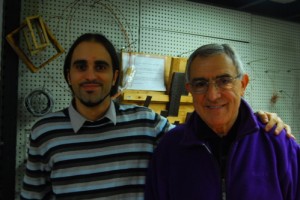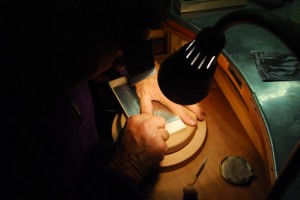
On a recent trip to Florence we met Elia Rizzo, winner of the 2010 scholarship at the Arti Orafe School for jewelry and artisanship. Fascinated by Elia’s passion for his work, we asked him to share some of his thoughts with us.
Q: Elia, when did you discover your love for metal work?
A: Well, in my case the story is really quite long and original, and it would probably take too much time to completely explain how my love started. Anyway I will try to explain it shortly: a few years ago I had a serious motorcycle accident which forced me to lay in bed without the possibility of moving for about a whole year. I had already had the pleasure of bending silver wire on stones as a hobby in the past. But when I found myself blocked in my bed wondering how to make this time pass for so many hours and so many days and so many months, this passion come out again and stronger then ever, and it helped me get through that hard times. As it often happens, from the moments we are forced to stand against difficulties, that’s when the real us comes out, and the path that we are properly made to walk naturally on is revealed. Or at least, this was what happened to me.
Q: What was the most important skill you learned in the Scuola Arti Orafe and in particular from the Engraving class?
A:This is a really difficult question to answer. I completed the academic path that Le arti orafe offers to their students. The course is three years, several hours of studying and practicing per day, and even when you’re out of the school you are expected to think and elaborate about the projects you have been working on during class. This may explain why it’s really difficult to individuate one skill.
What I can say, is that this course opened my mind to a lot of new things, and allowed me to think in a different way. When creating something, I learned to consider many aspects, both technical and conceptual.
For example, I may decide to use a specific material based on its qualities, but I may also decide to use an apparently improper one, finding a way to make it appropriate. I learned to consider wearability, beauty of the shape, attentions to colours and surface texture and to develop the deeper meaning of the object and taking in consideration the sensations it has to provoke in the wearer and the meaning it has to have to him/her. My preferred skill is probably the ability to use of my fantasy and having the technical capacity to realize my fantasies.
As for the engraving class, singling out one specific skill is even more difficult. Engraving is really a universe apart! Once you are in it, it’s impossible not to love it all. From the natural views representation, to the body forms representation, or the art of writing or just the decorative. Each of this skills is quite linked to the other. It may seems easy but it s a long and complex learning path.
One of my favorite aspects of this art is the decorative engraving on rings and jewellery in the highest level and on really small design and objects. It s difficult to even imagine how much small and complex an engraving of this kind may be in his role of apparently “simply decorative” function.
Q: Do you think you will continue your work in this field?
A:Of course I’ll continue! The more I go forward in learning and discovering things, the more my passion pulls me up in going further.
 Q: What do you think about the fact that so many artisans are disappearing from Firenze? What are your suggestions for improving and preserving this tradition in Florence and Tuscany?
Q: What do you think about the fact that so many artisans are disappearing from Firenze? What are your suggestions for improving and preserving this tradition in Florence and Tuscany?
A:This is a big problem, which is actually present in lot of fields, often even unseen. In my opinion, the key of the problem is that lately society has rewritten people’s perception of their necessities. Everyone seems to require more quantity and less quality. Just take a look at the “explosion” in the centre of Florence of commercial activities like cheap clothing stores, cheap food shops, mass-produced souvenir sellers. Of course this is a natural thing, but when these venues overtake the whole historical center of a city like Florence, we all know it’s a sign of something wrong.
Slowly but surely, artisans are abandoning their workshops and activities, because it’s difficult to compete, when people come to you asking factory prices for handmade quality, just because they are no longer used to buy artisanal products.
I believe this is our struggle, but also our opportunity to succeed: together (even artisans from different fields) we should revalue the imagine of the handmade, make clear to people the difference between mass produced and artisanal, hand made products.
Personally, this is what I’m really trying to do: put my best into the work I do, pushing the customer toward a vision of an individual and personal object quite like a “talisman” or an object to share our experience of life with. The object must become a very extension of us. For this reason, I develop my objects with the client and try to project the personality and sensibility of the client on each object.
Our responsibility as goldsmiths and artisans is not just “to start and make something”, to finish and take money as fast as we can, but to employ a little more time before starting with the realization of the work, to help with our experience and our trained eye the customer in focusing (and often discovering) his/her inner desires about the object.
If we take this time, we’ll obtain two main results in the long term: first, the customer will be happy and will develop a more critical eye. Additionally, this will lead him/her to look for good quality and understand the advantages of getting something made to measure.
We, artisans and goldsmiths, have the role of showing “art and beauty” (beauty as deep conscience, so not forcedly something nice, but something which is real life), and this is what we should focus on.
Unfortunately, these are difficult time. However, there are many things that could be done to improve the situation. The major could offer more help to opens or keep open the traditional activities that make Florence such a special place. In this sense of course Context Travel and its activities are perfectly in line and yet effective on this side, Context and the scholarship are one of the best things that has ever happened to me.
Q: What are your suggestions to other students like you, who are interested in starting a career in the same field?
A:Make things at you best, be exigent with yourself, the best you have to give will come out naturally in what you do.
Thank you Elia and good luck!

Pingback: Context Travel founder talks about Sustainable Travel | Context Travel Blog
Right on!